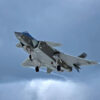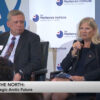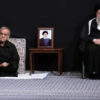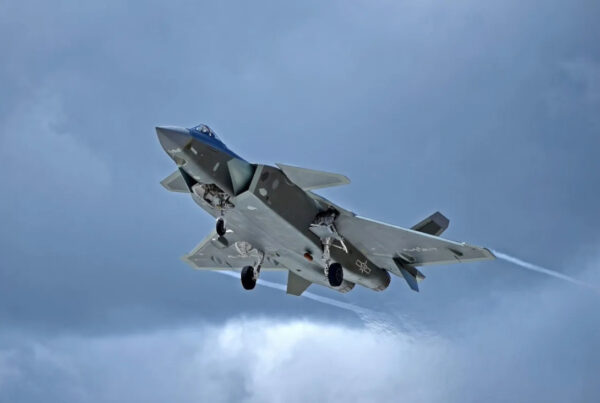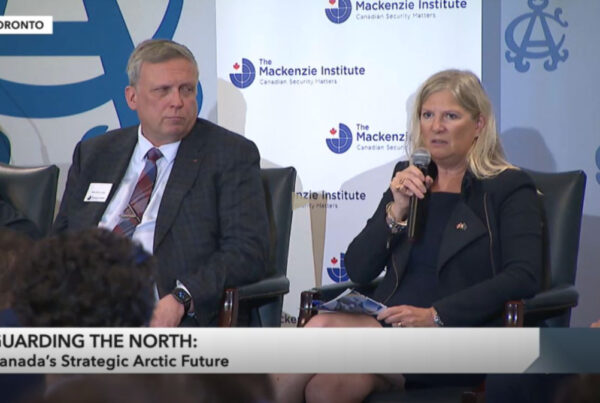The piece below is an article written by Diane Francis which originally appeared on her website on August 26, 2021. Check out the original here
Photo Caption: The team from the Pakistani air force makes their way to the first sector of the security forces combat arms event course during Air Mobility Command’s Rodeo 2007 at Fort Lewis, Wash., July 23, 2007. (U.S. Air Force photo by Senior Airman Clay Lancaster) (Released)
Of all the consequences that will result following the withdrawal from Afghanistan, the most calamitous would be if a crucible of terror is created involving Iran, Afghanistan, and Pakistan. Currently, all three are independent countries, with different cultures and political systems. And they aren’t about to unite anytime soon, but what binds them is their growing, radical Islamist elements and governments that don’t hesitate to indulge in state-sanctioned terrorism.
The most immediate concern in the Afghan aftermath is who or what will fill the vacuum created in a country the size of Texas now that America and NATO have left. Given the Taliban’s relative weakness, it’s most likely that Afghanistan will be mired in civil war and skirmishes, as before, and become a popular venue for the world’s Jihadists — providing a new homeland to replace the ISIS caliphate in Syria and Iraq which collapsed in 2019. That will, by default, make Pakistan the world’s most vulnerable and most dangerous nation-state.
The three nations are already on world security radars. Iran’s terrorism is widespread. Afghanistan is now run again by the same Taliban scourge that sheltered many terrorists, including Saudi Osama bin Laden before he pulled off the 9/11 attacks. And Pakistan is accused of many terrorist acts, fostered the Taliban, and took over harboring bin Laden for ten years after he fled Afghanistan until U.S. Navy SEALs found and killed him in 2011.
Of the three, Iran has been considered “enemy number one”, since the Shah fell in 1979 and the Ayatollah began to export violence. More recently, Tehran has been the focus of major diplomatic activity because of its nuclear ambitions. But in recent years, it has been compliant, after being paid off handsomely by the world’s governments to abandon plans to build a nuclear weapon.
The Taliban itself will remain relatively powerless, consisting of 200,000 “soldiers” who are members of a brutal, medieval fundamentalist sect that took control of Afghanistan only because the United States left and the Afghan government melted away. It is not a battle-hardened or sophisticated organization and will be preoccupied for years with trying to govern and control a country divided into factions and tribes.
Of greatest concern is Pakistan. Its secretive Inter-Services Intelligence (ISI) agency has been accused of assassinations and terrorist acts in South Asia and beyond by the governments of India, Iran, Afghanistan, America, Britain, Germany, and France. Most significantly, the Islamic Republic of Pakistan continues to wrestle with its own homegrown terrorist problem. This is where Wall Street Journal writer Daniel Pearl was beheaded in 2002 and where Nobel Prize winner Malala Yousafzai was shot in 2012 at 15 years of age on her way to school. In July 2019, Pakistani Prime Minister Imran Khan, on an official visit to the United States, acknowledged the presence of some 30,000–40,000 armed terrorists operating on Pakistani soil. This doesn’t include tens of thousands more in Afghanistan who are Pakistani. But, most terrifying of all, is the fact that the country is increasingly unstable and violent and has 150 nuclear weapons.
This week, John Bolton, former U.S. National Security advisor, was blunt and wrote that Pakistan must now become the focus of American and NATO attention. “The Taliban’s takeover next door immediately poses the sharply higher risk that Pakistani extremists [inside and outside the country] will increase their already sizeable influence in Islamabad, threatening at some point to seize full control,” he cautioned.
That’s enough to send chills down anyone’s back, including the guys who run the Russian and Chinese regimes, not to mention neighboring India, a sworn enemy of Pakistan. The two have been enmeshed in rivalry and warfare since 1947 when the British partition divided Britain’s “Jewel in the Crown” into India, Pakistan, and Bangladesh.
Meanwhile, Afghanistan has been orphaned for millennia, unconquerable, but more recently a “football” fought over and kicked around by Pakistan, Russia, the U.S., Iran, India, and a long list of terrorist outfits. But Islamabad has always meddled there and in 1979 created the Taliban to kick out the occupying Soviets, along with help from the U.S. and Saudi Arabia. Ever since Pakistan has remained pro-Taliban and after the Americans announced their exit Prime Minister Khan publicly hailed the Taliban’s return to power as a welcome sign that Afghans had “broken the shackles of slavery”.
The Pakistani PM’s bravado was aimed at arch-rival, India, which supported the American-backed Afghan regime by contributing $3 billion toward building infrastructure there. New Delhi was close to Kabul. “This [Indian support] caused a great deal of consternation because Pakistan’s entire foreign policy is shaped by fear of being encircled by India to the east and by a pro-Indian Afghan Government to the west and north,” explained a Chatham House expert.
Meanwhile, Iran has been cozying up to the Taliban after harboring many of its followers in exile during America’s Afghan occupation. Tehran has been an enthusiastic supplier of arms and funds and immediately began exporting fuel this month as well as providing bodyguards for Taliban leaders. In return, Iran wants the terrorists to keep the water flowing from Afghanistan and also to continue profiting from the country’s poppy and heroin exports by providing a path to smuggle the stuff to Europe. Clearly, the Iranians will be mindful of the country’s future if for no other reason than it provides a barrier against Pakistan.
Likewise, Pakistan has plenty of tricks up its sleeve concerning its neighbor and the region. The country’s ISI and military are duplicitous and cunning. For instance, in 1993 Pakistan was on the US Secretary of State’s list of terrorist-supporting nations, along with Iran, but vanished from the list after Pakistan became an ally in 2001 in President George W. Bush’s War Against Terror and ill-fated invasion of Afghanistan.
Pakistan’s misbehavior has been ignored or overlooked for far too long, Bolton states, and is unsustainable. Islamabad is best described as both an arsonist and a firefighter – at once stoking then creating terrorist organizations then fighting them. To push the metaphor, Pakistanis play with fire and if they get burned the whole damn planet or South Asia, may burn down too.
Even the remote possibility that its nuclear arsenal could be breached – or taken over by Al Qaeda or Pakistan’s homegrown Islamist radical organization called Tehrik-i-Taliban Pakistan [TTP] — is chilling. The TTP has a foothold in the country with tens of thousands of members and contributed 5,000 terrorists to help out Afghanistan’s Taliban. It targeted Malala.
Not surprisingly, terrorism and assassinations plague Pakistan itself. Most recently, there have been attacks against Chinese-owned assets and individuals. China is regarded as an alien influence, or another Great Satan, by the radicals but is a close ally of Pakistan’s, providing economic, arms, and technical assistance. For instance, China claims a small portion of disputed Kashmir and Pakistan claims the rest while India claims it all. Both countries regard India as an enemy and have staged attacks against it.
Pakistan is also unstable. The world’s fifth-most populous nation, with 225.2 million people and the second-largest Muslim population, its “democracy” has fluctuated between civilian and military governments mostly as a result of coups staged by the armed forces to replace weak governments. As a result, it’s what’s known as a “hybrid democracy” that holds relatively free elections, unlike India which is considered a fully-fledged democracy.
Any threat to Pakistan’s nuclear arsenal represents a different order of magnitude of risk. “The Taliban’s takeover next door immediately poses the sharply higher risk that Pakistani extremists will increase their already sizeable influence in Islamabad, threatening at some point to seize full control,” wrote Bolton.
This would imperil India and also, ironically, Iran because Iran is a Shia-dominant country while the Taliban and Pakistan’s TTP are Sunni Jihadists who regard Shias as infidels. For this and other reasons, Bolton suggests America, NATO, and the rest of the world must take a hard line against Pakistan, scrap aid if it helps the Taliban, and monitor its nuclear production and stockpiles.
The American withdrawal made headlines and nations brace for a flood of refugees. But the bigger story was found in the pages of the Jihadist media — in Africa, Asia, the Middle East, and among Hamas and Palestinian Islamic fanatics — that America’s defeat is Divine Intervention and a sign that the creation of Jihadistan is nigh.
God help us all if that’s true.

